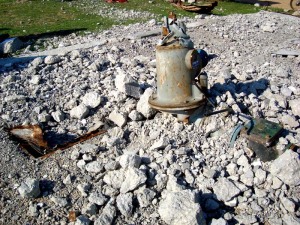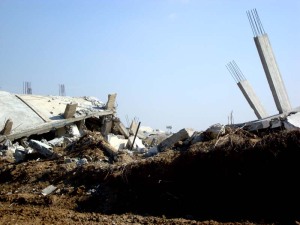 Terrorists plan to commemorate Meir Kahane
Terrorists plan to commemorate Meir KahaneBy JONATHAN COOK
Nazareth - November 20, 2009
A plan by right-wing legislators in Israel to commemorate the anniversary this month of the death of Meir Kahane, whose banned anti-Arab movement is classified as a terrorist organization, risks further damaging the prospects for talks between Israel and the Palestinians, US officials have warned.
A move to stage the commemoration in Israel’s parliament, the Knesset, is being led by Michael Ben-Ari, who was elected this year and is the first self-declared former member of Kahane’s party, Kach, to become a legislator since the movement was banned 15 years ago.
The US Embassy, in Tel Aviv, has sent a series of e-mails to Reuven Rivlin, the parliamentary speaker, asking that he intervene to block the event.
According to US officials, pressure is being exerted on behalf of George Mitchell, the US president Barack Obama’s envoy to the region, who is concerned that it will add to his troubles as Israeli and Palestinian leaders clash over a possible move by the Palestinians to issue a unilateral declaration of statehood.
Some Israeli legislators have warned that Mr Ben-Ari and his supporters are gaining a stronger foothold in parliament, in an indication of the country’s increasing lurch rightwards.
“Ben-Ari and the advisers he has brought with him are unabashed representatives for Kach and Kahane’s ideas,” said Ahmed Tibi, an Arab legislator and the deputy speaker. “What we have is in effect a terrorist cell in the parliament.”
Kahane, a US rabbi who emigrated to Israel in the early 1970s, advocated the expulsion of all Arabs from “Greater Israel”, an area that the far right believes encompasses not only Israel but also the occupied Palestinian territories of the West Bank and Gaza Strip, and parts of neighbouring Arab states.
Kahane was elected to parliament in 1984 but was barred from standing again four years later. He was assassinated by an Egyptian-American in New York in November 1990.
In 1994 Kach was declared a terrorist organization by Israel and the United States after Baruch Goldstein, a supporter, went on an armed rampage through the Ibrahimi mosque in the Palestinian city of Hebron, killing 29 worshippers and injuring 150.
Despite the ban, Kach is still active in many West Bank settlements, especially in and around Hebron, where shrines to Kahane and Goldstein regularly attract large numbers of devotees.
Mr Ben-Ari, one of four members of the National Union elected to the 120-seat parliament, has included as his parliamentary advisers two former Kach activists, Baruch Marzel and Itimar Ben Gvir, who are leaders of the far-right Jewish National Front. Mr Ben-Ari has never disavowed his support for Kahane, telling the Jerusalem Post newspaper this month that Kahane “dedicated his whole life to Israel … He was a great man and a great leader.”
This month Mr Ben-Ari was the voice on an advertisement on the Israeli radio station Reshet Bet to promote a public memorial service for Kahane held by his family. It was also reported that for the first time posters had been placed in many central areas of Jerusalem publicising the event and declaring “We all know now – Meir Kahane was right”.
The United States has expressed more concern, however, at a commemoration being planned in parliament.
Michael Perlstein, the second secretary at the US Embassy, is reported to have e-mailed Mr Rivlin several times, asking whether the commemoration was likely to be approved. According to e-mails leaked to the Israeli media, he added: “This is something Senator Mitchell and his team are following with some concern.”
An embassy spokesman reiterated those concerns last week: “To stir up controversy at the same time that we are trying to get people back to the [negotiating] table, is not productive of that effort. It is only natural that Senator Mitchell would be paying attention to that – and the US government as well.”
Mr Rivlin has reassured the United States that he has refused Mr Ben-Ari permission to stage a commemoration but has also admitted that it would be difficult for him to stop a “stunt” by Kahane supporters in the chamber.
“We are talking about a provocation,” Mr Rivlin told the Haaretz newspaper. “The man [Kahane] and his outlawed movement cannot be separated. This is an attempt to bring the Kach movement into the Knesset through the back door.”
Last week, Mr Ben-Ari appealed against the speaker’s decision to the House Committee, which rules on issues of parliamentary procedure. Mr Rivlin has said he will abide by the committee’s decision.
Its chairman, Yariv Levine of the ruling Likud Party, said he was not happy with Mr Rivlin’s refusal and is reported to be working with the speaker and Mr Ben-Ari to find a solution.
Mr Ben-Ari responded angrily to the US concern: “I was elected to the Knesset by citizens of the independent state of Israel. The flagrant involvement of Mitchell has crossed a red line and it testifies to the bowed head of the Knesset speaker that is turning the Knesset into a dish rag.”
Mr Ben-Ari is probably not the only former member of Kach in parliament. Avigdor Lieberman, the foreign minister and leader of the far-right Yisrael Beitenu party, the third largest in parliament, is believed to have joined Kach when he first arrived in Israel in the 1970s. His membership was revealed in February by Yossi Dayan, the movement’s former secretary general.
Last week Mr Ben-Ari had to cancel a trip to the United States, his first overseas visit, after he was refused a US visa. He had intended to speak to American Jewish groups to encourage emigration to Israel.
To date, the only authorized parliamentary commemorations are for Yitzhak Rabin, the prime minister assassinated by a right-wing Jew in 1995, and for Rehavam Zeevi, a former general and leader of a far-right anti-Arab party, who was assassinated by Palestinian gunmen in 2001.
Jonathan Cook is a writer and journalist based in Nazareth, Israel. His latest books are “Israel and the Clash of Civilisations: Iraq, Iran and the Plan to Remake the Middle East” (Pluto Press) and “Disappearing Palestine: Israel's Experiments in Human Despair” (Zed Books). His website is www.jkcook.net.
A version of this article originally appeared in The National (www.thenational.ae)
















